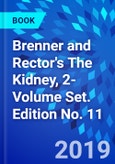- Extensively updated chapters throughout, providing the latest scientific and clinical information from authorities in their respective fields.
- Lifespan coverage of kidney health and disease from pre-conception through fetal and infant health, childhood, adulthood, and old age.
- Discussions of today's hot topics, including the global increase in acute kidney injury, chronic kidney disease of unknown etiology, cardiovascular disease and renal disease, and global initiatives for alternatives in areas with limited facilities for dialysis or transplant.
- New Key Points that represent either new findings or "pearls" of information that are not widely known or understood.
- New Clinical Relevance boxes that highlight the information you must know during a patient visit, such as pertinent physiology or pathophysiology.
- Hundreds of full-color, high-quality photographs as well as carefully chosen figures, algorithms, and tables that illustrate essential concepts, nuances of clinical presentation and technique, and clinical decision making.
- A new editor who is a world-renowned expert in global health and nephrology care in underserved populations, Dr. Valerie A. Luyckx from University of Z?rich.
- Board review-style questions to help you prepare for certification or recertification.
- Enhanced eBook version included with purchase, which allows you to access all of the text, figures, and references from the book on a variety of devices
Table of Contents
1. Embryology of the Kidney2. Anatomy of the Kidney
3. The Renal Circulations and Glomerular Ultrafiltration
4. Glomerular Cell Biology
5. Metabolic Basis of Solute Transport
6. Transport of Sodium, Chloride, and Potassium
7. The Regulation of Calcium, Magnesium, and Phosphate Excretion by the Kidney
8. Renal Handling of Organic Solutes
9. Renal Acidification Mechanisms
10. Urine Concentration and Dilution and The Cell Biology of Vasopressin Action
11. Vasoactive Molecules and the Kidney
12. Aldosterone and Mineralocorticoid Receptors: Renal and Extrarenal Roles
13. Arachidonic Acid Metabolites and the Kidney
14. Disorders of Sodium Balance
15. Disorders of Water Balance
16. Disorders of Acid-Base Balance
17. Disorders of Potassium Balance
18. Disorders of Calcium, Magnesium, and Phosphate Balance
19. Epidemiology of Kidney Disease
20. Risk Prediction in Chronic Kidney Disease
21. Developmental Programming of Blood Pressure and Renal Function
22. Physiology and Pathophysiology of the Aging Kidney
23. Clinical Approach and Laboratory Assessment of the patient with kidney disease
24. Interpretation of Electrolyte and Acid-Base Parameters in Blood and Urine
25. Diagnostic Kidney Imaging
26. The Kidney Biopsy
27. Biomarkers in Acute and Chronic Kidney Diseases
28.� Pathophysiology of Acute Kidney Injury
29. Prevention and Management of Acute Kidney Injury
30. Pathophysiology of Proteinuria
31. Primary Glomerular Disease
32. Secondary Glomerular Disease
33. Overview of Therapy for Glomerular Disease
34. Thrombotic Microangiopathy and Microvascular Disease
35. Tubulointerstitial Diseases
36. Urinary Tract Infection in Adults
37. Urinary Tract Obstruction
38. Urinary Stone Disease
39. Diabetic Nephropathy
40. Cardiorenal Syndromes
41. Kidney Cancer
42. Onco-Nephrology: Kidney Disease in Patients with Cancer
43. Inherited Disorders of the Glomerulus
44. Inherited Disorders of the Renal Tubule
45. Cystic Diseases of the Kidney
46. Primary and Secondary Hypertension
47. Renovascular Hypertension and Ischemic Nephropathy
48. Pregnancy and Kidney Disease
49. Antihypertensive Therapy
50. Diuretics
51. Mechanisms of Progression of Chronic Kidney Disease
52. The Pathophysiology of Uremia
53. Chronic Kidney Disease-Mineral Bone Disorder
54. Cardiovascular Aspects of Kidney Disease
55. Hematologic Aspects of Kidney Disease
56. Endocrine Aspects of Chronic Kidney Disease
57. Neurologic Aspects of Kidney Disease
58. Dermatologic Conditions in Kidney Disease
59. Staging and Management of Chronic Kidney Disease
60. Dietary Approaches to Kidney Diseases
61. Drug Dosing Considerations in Patients with Acute Kidney Injury and Chronic Kidney Disease
62. Supportive Care in Advanced Kidney Disease
63. Hemodialysis
64. Peritoneal Dialysis
65. Critical Care Nephrology
66. Plasmapheresis
67. Elimination Enhancement of Poisons
68. Interventional Nephrology
69. Transplantation Immunobiology
70. Clinical Management of the Adult Kidney Transplant Recipient
71. Considerations in Live Kidney Donation
72. Diseases of the Kidney and Urinary Tract in Children
73. Fluid, Electrolyte, and Acid-Base Disorders in Children
74. Renal Replacement Therapy (Dialysis and Transplantation) in Pediatric End-Stage Kidney Disease
75. Global Challenges and Initiatives in Kidney Health
76. Latin America
77. Africa
78. Near and Middle East
79. Indian Subcontinent
80. Far East
81. Oceania Region
82. Ethical Dilemmas Facing Nephrology: Past, Present, and Future
83. Health Disparities in Nephrology
84. Care of the Older Adult with Chronic Kidney Disease
85. Stem Cells, Kidney Regeneration, Gene and Cell Therapy in Nephrology
Authors
Alan S. L. Yu Harry Statland and Solon Summerfield Professor of Medicine, Director, Division of Nephrology and Hypertension and the Kidney Institute, University of Kansas Medical Center, Kansas City, Kansas. Glenn M. Chertow Norman S. Coplon/ Satellite Healthcare, Professor of Medicine, Chief, Division of Nephrology, Stanford University School of Medicine, Stanford, Palo Alto, California, USA. Valerie Luyckx Affiliate Lecturer, Renal Division, Brigham and Women's Hospital, Harvard Medical School, Boston, MA, Institute of Biomedical Ethics and the History of MedicineUniversity of Zurich, Zurich, Switzerland. Philip A. Marsden Professor of Medicine, Elisabeth Hofmann Chair in Translational Research, Oreopoulos-Baxter Division Director of Nephrology; Vice Chair Research, Department of Medicine, University of Toronto, Toronto, Ontario, Canada. Karl Skorecki Annie Chutick Professor and Chair in Medicine (Nephrology), Technion-Israel Institute of Technology, Director of Medical and Research Development, Rambam Health Care Campus, Haifa, Israel. Maarten W. Taal Professor of Medicine, Division of Medical Sciences and Graduate Entry Medicine, University of Nottingham; Honorary Consultant Nephrologist, Department of Renal Medicine, Royal Derby Hospital, Derby, United Kingdom.








